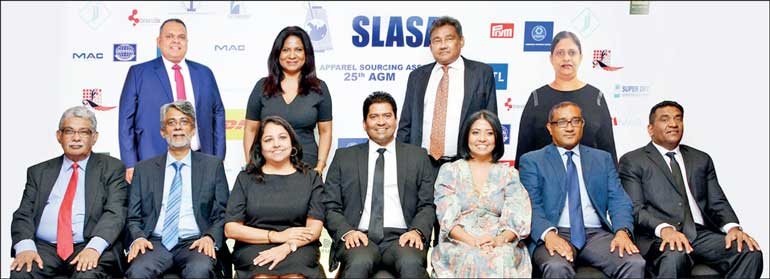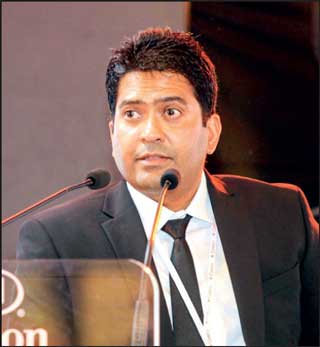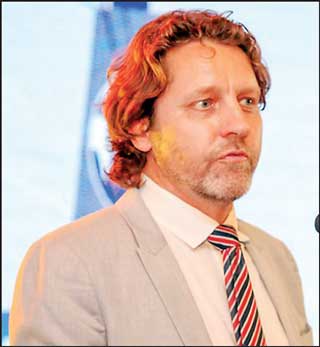Wednesday Feb 18, 2026
Wednesday Feb 18, 2026
Friday, 21 October 2022 00:05 - - {{hitsCtrl.values.hits}}

SLASA Ex-Co for 2022/23
Seated from left: Past Chairman Anil Wettewe, Secretary General Gopal K. Iyer, Vice Chairman Shweta Dhir, Chairman Wilhelm Elias, Vice Chairman Azmina Kareem, Secretary Gayan Galapitige, Hon. Treasurer Denver Jayasundara
Standing from left: Ex-Co Members Padmal Silva, Angie Dep, Yasmi Bari, Manjula Bahlendran
 |
| SLASA Chairman Wilhelm Elias speaks to the membership at the AGM |
 |
| SLASA AGM Chief Guest EU Charge d’Affaires Thorston Bargfrede
|
The Sri Lanka Apparel Sourcing Association held its 25th Annual General Meeting recently under the aegis of EU Charge d’Affaires Thorston Bargfrede for the post-business session.
Wilhelm Elias was re-elected Chairman, while the Vice Chairmen elected were Shweta Dhir and Azmina Kareem, Treasurer Denver Jayasundara and Secretary Gayan Galapitige as Office-bearers for the year 2022/23. Gopal K. Iyer was appointed Secretary General for the Association.
One of the most powerful messages emerging from Chief Guest Bargfrede Chairman Wilhelm Elias and the Vice Chairmen Azmina Kareem and Shweta Dhir, was that while the apparel industry had shown extraordinary tenacity and resilience through COVID and the economic crisis, well-evidenced by the good export results Sri Lanka was showcasing in 2022, there was a need to transform and that too with urgency.
Commending SLASA members for demonstrating the maturity of the industry and emerging stronger and more vibrant post the pandemic, Elias described the rapid transformation seen within the industry during the economic crisis as truly remarkable. “We adapted to new ways of doing business while also keeping the country’s needs a priority. There was no rule book to work on but business leaders demonstrated how the industry was flexible and quick to adapt while reaffirming Sri Lanka’s reputation of being a safe pair of hands.”
He added that in the next half of 2022, external forces are emerging, prompting a drop in numbers with galloping inflation west, customers being over-stocked and disposable income reducing.
Elias said competitor countries will hard to keep business they gain from Sri Lanka even temporarily and hence; the industry must ensure that buyers are given good reason to move back to Sri Lanka. “In the larger picture, all apparel manufacturing countries are seeing an organic decline in business levels and we need to be conscious of reducing prices.”
Vice Chairman Azmina Kareem had similar sentiments, augmenting Elias’ message that the industry needs to focus on opportunity. “Firstly, it’s about service and adaptability,” she explained.
“Customer expectations are moving beyond to an end to end service model and suppliers are being empowered to do more for brands which is the bigger expectation of the brands. The traditional buyer-supplier relationship is diminishing.” She also emphasised a rebranding for Sri Lanka as a trading destination, taking advantage of the short transit times and cost competitiveness
Vice Chairman Shweta Dhir detailed a three-pronged approach. “Fabric sourcing needs to be diversified; we must hedge our risks with a healthy mix of near shore and indigenous fabric sourcing, focusing on aesthetics together with innovation.
“And the conscious consumer is here to stay which, with Sri Lanka being far ahead in terms sustainability initiatives, we can be the first port of call for many labels who plan to become transparent and responsible.
“Thirdly, we must showcase our product strengths, creating showrooms with shipped products constantly re-quipped with newness and market intelligence to buyers – sufficient with just sketch, swatch and digital representations.”
To meet the industry target of $ 8 billion by 2025 and determined to rally the troops, Elias stressed the need for relationship building which will come under stress in the months to come. “We are not the most cost-effective country, but we must transform our renowned resilience and tenacity into opportunity by building on our strengths and re-thinking our strategy, keeping that foundation of relationship building strong.”